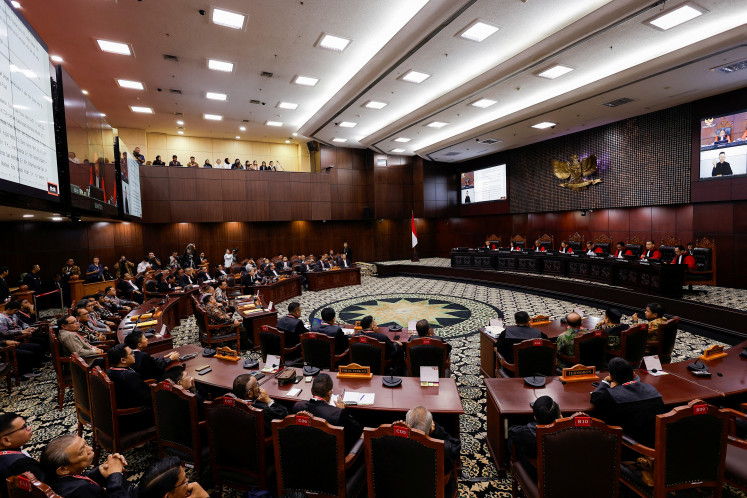BP Batam fixes issues at seaports
The new board of the Batam Indonesia Free Trade Zone Authority (BP Batam) has taken its first measure to maximize services in the country’s first free trade zone (FTZ) by overhauling seaport management
Change Size

T
he new board of the Batam Indonesia Free Trade Zone Authority (BP Batam) has taken its first measure to maximize services in the country’s first free trade zone (FTZ) by overhauling seaport management.
With lengthy and complicated procedures on the movement of goods to and from the zone, overlapping port authorities had put an extra burden on business players operating in Batam, resulting in lost time and high costs.
The authority inked on Tuesday a memorandum of understanding (MoU) with the Transportation Ministry to clarify the roles of each institution under Batam’s port management.
BP Batam will be fully in charge of operations, focusing mainly on daily operations at ports, while the ministry will act as a regulator that handles security and shipping movements. The authority expects to regain investors’ trust with the move to carry out reforms at ports in Batam, said BP Batam chief Lukita Dinarsyah.
“We were aware of the fact that Batam’s economy was on the decline. We hope that [with the MoU], the flow of goods will increase, while the services will also improve,” Lukita said after the signing at the Administrative and Bureaucratic Reform Ministry’s office.
Situated one hour by ferry from Southeast Asia’s business hub Singapore, Batam has three ports to handle the movement of goods: Batu Ampar Port, the main seaport located in the northern part of the island, Sekupang Port in the east and Kabil Port, which is also in the east and mainly serves crude palm oil (CPO) cargoes.
Administrative and Bureaucratic Reform Minister Asman Abnur said that with the agreement, the Transportation Ministry was required to establish a harbormaster’s office, while BP Batam would need to set up a separate port management office.
Both institutions must also begin data exchange on ship traffic at the ports.
The Administrative and Bureaucratic Reform Ministry, meanwhile, would soon finish drafting the government regulation on the new arrangement at the ports, Asman said.
President Joko “Jokowi” Widodo is expected to sign the regulation at the end of this year.
“We hope the new regulation will be effective early next year so that the new system can be implemented,” Asman said.
Local businesspeople in Batam welcomed the structural reform. The chairman of the Chamber of Commerce and Industry’s Batam chapter, Djadi Rajagukguk, said the port management in Batam lacked cohesiveness because business players submitted permits to different authorities.
“A lot of officials from different institutions in Batam ports were responsible for different permits and rules, such as the boat parking rule, mooring permits, anchoring permits as well as loading and unloading permits. All should be synchronized so businesspeople can run their activities smoothly,” he told The Jakarta Post.
The central government appointed the new BP Batam management on Oct. 19 to address complaints from business players and restore their confidence in the FTZ, once a darling for investors.
Several companies have shut down operations in Batam, prompting slower economic growth. While Batam’s economy grew by 5.45 percent in 2016, it expanded below 2 percent in the first half of this year. Lukita said his next job was to ease export duties for companies wanting to sell Batam-produced goods to other regions in Indonesia.
As the FTZ was originally designed for the export-oriented industry with special tax treatments, a number of companies ship their goods to neighboring Singapore, which sends them back with zero duties.
“In the long term, we will solve this problem by transforming the Batam FTZ into a special economic zone. However, in the short term, we have talked with the Finance Ministry on the revision of the rule regarding the duties in the FTZ,” Lukita said.









